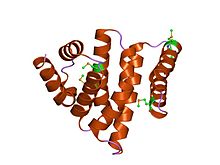EIF-W2 protein domain
| W2 | |||||||||
|---|---|---|---|---|---|---|---|---|---|
 crystal structure of the catalytic fragment of eukaryotic initiation factor 2b epsilon | |||||||||
| Identifiers | |||||||||
| Symbol | W2 | ||||||||
| Pfam | PF02020 | ||||||||
| Pfam clan | CL0020 | ||||||||
| InterPro | IPR003307 | ||||||||
| SCOP2 | 1paq / SCOPe / SUPFAM | ||||||||
| |||||||||
In molecular biology, the protein domain eIF4-gamma/eIF5/eIF2-epsilon is a family of evolutionarily related proteins. This domain is found at the C-terminus of several translation Initiation factors.[1] It was first detected at the very C-termini of the yeast protein GCD6, eIF-2B epsilon, and two other eukaryotic translation initiation factors, eIF-4 gamma and eIF-5 and it may be involved in the interaction of eIF-2B, eIF-4 gamma, and eIF-5 with eIF-2.[1]
Function[edit]
In molecular biology, the eIF-W2 domain functions as the binding site for Mnk eIF4E kinase,[2] an enzyme that phosphorylates eukaryotic initiation factor 4E (eIF4E). For eIF2B-epsilon, the W2 C-terminal domain functions in guanine nucleotide exchange on eIF2. For eIF5, the W2 domain functions in mediating the multifactor complex (MFC) formation with eIF1, eIF2-GTP, eIF3 and Met-tRNAiMet. The eIF5 W2 C-terminal domain and the adjacent N-terminal linker region are responsible for the GDI activity against eIF2-GDP.[3]
Domain Structure[edit]
The W2 domain has a globular fold and is exclusively composed out of alpha-helices.[4][5][6] The structure can be divided into a structural C-terminal core onto which the two N-terminal helices are attached. The core contains two aromatic/acidic residue-rich regions (AA boxes), important for mediating protein-protein interactions.
This entry covers the entire W2 domain, part of the TPR clan.
Translation[edit]
Translation initiation is a well regulated and highly coordinated cellular process in eukaryotes, in which at least 11 eukaryotic initiation factors (eIFs) are included.[7] These factors come together to form the pre-initiation complex.
Eukaryotic initiation factors[edit]
The W2 domain (two invariant tryptophans) is a region of approximately 165 amino acids which is found in the C-terminus of the following eukaryotic initiation factors(eIFs):
- Eukaryotic translation initiation factor 2B epsilon (eIF-2B-epsilon) [1]
- Eukaryotic translation initiation factor 4 gamma (eIF-4-gamma) [2]
- Eukaryotic translation initiation factor 5 (eIF-5), a GTPase-activating protein (GAP) specific for eIF2 [3]
Examples[edit]
Genes encoding proteins containing this domain include AAG1, BZW1, BZW2, EIF2B5, EIF4G1, EIF4G2, EIF4G3, and EIF5.
References[edit]
- ^ a b Koonin EV (1995). "Multidomain organization of eukaryotic guanine nucleotide exchange translation initiation factor eIF-2B subunits revealed by analysis of conserved sequence motifs". Protein Sci. 4 (8): 1608–1617. doi:10.1002/pro.5560040819. PMC 2143190. PMID 8520487.
- ^ Singh CR, Watanabe R, Zhou D, Jennings MD, Fukao A, Lee B, et al. (2011). "Mechanisms of translational regulation by a human eIF5-mimic protein". Nucleic Acids Res. 39 (19): 8314–28. doi:10.1093/nar/gkr339. PMC 3201852. PMID 21745818.
- ^ Fukunaga R, Hunter T (1997). "MNK1, a new MAP kinase-activated protein kinase, isolated by a novel expression screening method for identifying protein kinase substrates". EMBO J. 16 (8): 1921–33. doi:10.1093/emboj/16.8.1921. PMC 1169795. PMID 9155018.
- ^ Boesen T, Mohammad SS, Pavitt GD, Andersen GR (March 2004). "Structure of the catalytic fragment of translation initiation factor 2B and identification of a critically important catalytic residue". J. Biol. Chem. 279 (11): 10584–92. doi:10.1074/jbc.M311055200. PMID 14681227.
- ^ Wei Z, Xue Y, Xu H, Gong W (May 2006). "Crystal structure of the C-terminal domain of S.cerevisiae eIF5". J. Mol. Biol. 359 (1): 1–9. doi:10.1016/j.jmb.2006.03.037. PMID 16616930.
- ^ Bieniossek C, Schütz P, Bumann M, Limacher A, Uson I, Baumann U (July 2006). "The crystal structure of the carboxy-terminal domain of human translation initiation factor eIF5". J. Mol. Biol. 360 (2): 457–65. doi:10.1016/j.jmb.2006.05.021. PMID 16781736.
- ^ Koonin EV (August 1995). "Multidomain organization of eukaryotic guanine nucleotide exchange translation initiation factor eIF-2B subunits revealed by analysis of conserved sequence motifs". Protein Sci. 4 (8): 1608–17. doi:10.1002/pro.5560040819. PMC 2143190. PMID 8520487.
